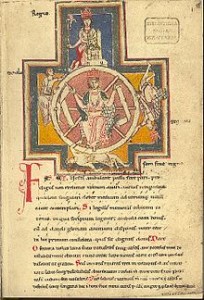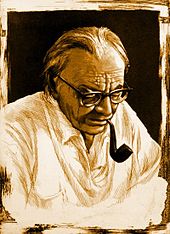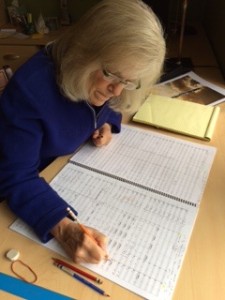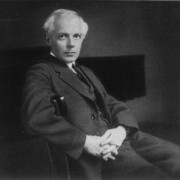Marlene’s Musings
February, 2013
The fickleness of fate,
The treacherous territories of greed, lust and gluttony
The joy of spring
Love songs
 These are the age-old, timeless themes of Carl Orff’s amazing secular cantata, Carmina Burana. All of the texts were written during the 11th, 12th and 13th centuries. Orff selected only 24 poems and writings from a huge and beautifully bound volume of 254 poems discovered in 1803 when the monastery, Benediktbeuern, was secularized. The title, literally translated, means Songs of Beuern.
These are the age-old, timeless themes of Carl Orff’s amazing secular cantata, Carmina Burana. All of the texts were written during the 11th, 12th and 13th centuries. Orff selected only 24 poems and writings from a huge and beautifully bound volume of 254 poems discovered in 1803 when the monastery, Benediktbeuern, was secularized. The title, literally translated, means Songs of Beuern.
I find the backstory of every piece of music fascinating but this one has special intrigue. Who were the poets? The texts are NOT AT ALL religious. In fact, some are bawdy and lascivious.
WHO WROTE THE TEXTS?
Probably travelling minstrels, defrocked priests, students satirizing the Catholic Church and many, scholars think, were written by the Goliards.
The Goliards were known for their rioting, gambling and intemperance rather than their scholarship. They were often erroneously supposed to have been a religious order, an idea that arises from their satiric order of St. Golias, the fictitious patron saint of debauchery. The actual word goliard may derive from the Old French and means “big mouth.”
You’ve heard of the troubadours, right? Well, the Goliards were to the Troubadours what John Belushi was to Sir Lawrence Olivier. Both the Troubadours and the Goliards earned food, drink and lodging from their songs and poetry. The audience for the troubadours was the high and mighty, so they created sophisticated songs for connoisseurs of music and poetry. The audience for the Goliards was the middle and lower classes, so the Goliards, who tended to be rebellious and irreverent, created witty songs for the connoisseurs of cynicism and raunch. Although the goliards were initially tolerated and protected, their multiplying numbers eventually turned into a plague of beggars and their irreverence provoked an increasingly conservative church hierarchy, which began suppressing the movement.
The texts are in three different languages – Old Provencal French, Middle German and Medieval Latin. This fact has caused quite a bit of angst for our fabulous singers. These are unfamiliar languages to all of them and to me. Making sure that every syllable is correctly pronounced has been quite a task. Since languages continue evolving, you can imagine the changes and morphing that has taken place since the texts were written 900 years ago! Is the “v” pronounced as a “v” or an “f?” Is “que” pronounced “kvay” or “kvee” or “quay” or “quee?” You get the idea.
THE MUSIC
 Even if you don’t think you’ve heard the piece, I’m quite certain you will recognize the opening lines of “O Fortuna.” It has been used in movies, trailers, advertisements and commercials. Even at the 2013 Superbowl, when San Francisco rallied and it looked like they just might trump the Ravens, I heard the main theme. The text at that point speaks about never being too cocky about your good fortune. The goddess, Fortuna, whose wheel continues to turn, will elevate you and then debase you on a whim. It appears there is no escaping that inevitable part of human existence.
Even if you don’t think you’ve heard the piece, I’m quite certain you will recognize the opening lines of “O Fortuna.” It has been used in movies, trailers, advertisements and commercials. Even at the 2013 Superbowl, when San Francisco rallied and it looked like they just might trump the Ravens, I heard the main theme. The text at that point speaks about never being too cocky about your good fortune. The goddess, Fortuna, whose wheel continues to turn, will elevate you and then debase you on a whim. It appears there is no escaping that inevitable part of human existence.
Musically speaking, there is almost no polyphony in the work. Rather, rhythm is the central feature. The piece is easy to listen to but far from pabulum. Even without motivic development or harmonic complexity, the texts are fascinating and the music riveting in its energetic and driven pace.
Carmina Burana is one of those pieces you’ll never forget – from the opening and most famous, “O Fortuna” to the greatest drinking song of all time, “In the Tavern,” to the rapturous high D in the soprano aria, “Oh, Sweetest One.”
A favorite of the soloist arias is “O Trutina.” The music is so glorious and tender as it accompanies such an internal struggle between virtue and desire.
With more than 200 people on stage this will be quite an event!
Everyone is working so hard. When the music is great, hard work is the gift we give ourselves in order to experience the powerful transformative feelings that only music can give. A reward in extremely valuable currency!
 It is a humbling thing to hold a score in my hands for the first time. I know it sounds a little crazy but it is somewhat akin to holding our newborn daughter for the first time. I am filled with awe of the creation but also aware of the daunting responsibility of shepherding it forward. My job, as conductor, is to try and understand, through careful study, what the composer intended. As a mother I tried to honor my daughter’s a priori intent as a human being without imposing too much of myself. A lofty goal, indeed! The ironic thing is that you cannot possibly hope to give life to the composition unless you put your heart and soul into it.
It is a humbling thing to hold a score in my hands for the first time. I know it sounds a little crazy but it is somewhat akin to holding our newborn daughter for the first time. I am filled with awe of the creation but also aware of the daunting responsibility of shepherding it forward. My job, as conductor, is to try and understand, through careful study, what the composer intended. As a mother I tried to honor my daughter’s a priori intent as a human being without imposing too much of myself. A lofty goal, indeed! The ironic thing is that you cannot possibly hope to give life to the composition unless you put your heart and soul into it.


